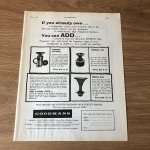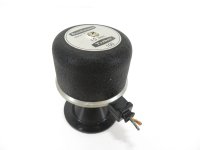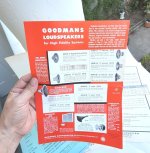So I tried the Klipsch in place of the trebax and also the second midax in place of the trebax with the Klipsch in place of the ribbon and the Klipisch in place of the trebax sounded better.
I shall need to ponder that!

I suppose the Klipsch sounds better because it's an actual horn. From what I understand there's an upgraded diaphragm for the Klipsch tweeter that makes it sound better.
Only requires a 7 ohm resistor in series with it to make it 15 ohms impedance then whatever attenuation is needed to make it the same level as a midax.
To ensure the Klipsch was phased correctly I fed a 5kHz signal to the amp and when the Klipsch was out of phase with the midax, there was a dead spot between the midax and Klipsch where I heard practically nothing with my ear close to the box.
Only requires a 7 ohm resistor in series with it to make it 15 ohms impedance then whatever attenuation is needed to make it the same level as a midax.
To ensure the Klipsch was phased correctly I fed a 5kHz signal to the amp and when the Klipsch was out of phase with the midax, there was a dead spot between the midax and Klipsch where I heard practically nothing with my ear close to the box.
If you have Trebax 100 units that will be indicated on the magnet label, as shown in the second attachment.
Feast your eyes on the Audiom 60, Midax, Trebax 100 and crossover bundle shown in the third attachment (currently at auction for £250 buy it now).
Feast your eyes on the Audiom 60, Midax, Trebax 100 and crossover bundle shown in the third attachment (currently at auction for £250 buy it now).
Attachments
I'll keep the third regular midax as I have a second Klipsch horn from a KG4 speaker.
That way if I do happen to find a pair of identical RCA woofers I can make a pair of speakers for stereo.
That way if I do happen to find a pair of identical RCA woofers I can make a pair of speakers for stereo.
For the cabinet if I have one properly made out of wood I am thinking 1" spacing between drivers should be fine.
So if I do that and include 2" between the top of the cabinet and tweeter and the bottom of the cabinet and woofer I get 39" height. Width is 26" Depth I forgot to measure, but can do so tomorrow.
Would 1/2" thick plywood be good enough?
I would pay someone to build the cabinet.
So if I do that and include 2" between the top of the cabinet and tweeter and the bottom of the cabinet and woofer I get 39" height. Width is 26" Depth I forgot to measure, but can do so tomorrow.
Would 1/2" thick plywood be good enough?
I would pay someone to build the cabinet.
Would 1/2" thick plywood be good enough?
It would be better than cardboard! 😉
You can damp the vibrations of thin enclosure walls by gluing on sections of Gyproc (drywall or plasterboard).
These sections do not have to cover the entire internal area of the enclosure walls to be effective.
https://www.aes.org/images/e-lib/thumbnails/8/4/848_full.png
While working today I listened to the speaker and noticed something seemed off.
Seemed like there was a hole in the audio on some songs and it seemed like it was the woofers.
So I fired the audio generator up at 950Hz and fed it to the amp driving the speaker.
There seemed to be a dead spot between the top woofer and midax so i swapped the polarity to the woofers and it seemed to be better.
I then played music and it sounded a bit better.
Seemed like there was a hole in the audio on some songs and it seemed like it was the woofers.
So I fired the audio generator up at 950Hz and fed it to the amp driving the speaker.
There seemed to be a dead spot between the top woofer and midax so i swapped the polarity to the woofers and it seemed to be better.
I then played music and it sounded a bit better.
Are there clear polarity markings on the 12" driver terminals? Remember I haven't seen the rear of your particular drivers.
Any which way, you are at liberty to change the relative polarities of the different drivers in order to achieve the best sound to your ears.
Have you made a decision regarding the construction of a plywood enclosure? Since we're not talking about domestic use, I'm sure you are sufficiently skilled to build a loudspeaker cabinet that won't look out of place in a work environment.
P.S. I think your RCA woofers would perform better in a 'distributed port' enclosure than an open back enclosure.
Back in the early 1970s, each of my full range 12" drivers resided in a 3 cubic foot distributed port enclosure.
In the solid back panel there were ten rows of fifteen, 0.5" diameter holes, covered internally by felt cloth for extra acoustic resistance.
Similar to the enclosure in this image, but with the holes in the back panel of course:

I you are interested in constructing such an enclosure, the number of holes must suit your enclosure's internal volume.
Here's how you can arrive at the correct number of 0.5" diameter holes:
Something to consider for the future perhaps? I know you like tweaking! 😉
Any which way, you are at liberty to change the relative polarities of the different drivers in order to achieve the best sound to your ears.
Have you made a decision regarding the construction of a plywood enclosure? Since we're not talking about domestic use, I'm sure you are sufficiently skilled to build a loudspeaker cabinet that won't look out of place in a work environment.
P.S. I think your RCA woofers would perform better in a 'distributed port' enclosure than an open back enclosure.
Back in the early 1970s, each of my full range 12" drivers resided in a 3 cubic foot distributed port enclosure.
In the solid back panel there were ten rows of fifteen, 0.5" diameter holes, covered internally by felt cloth for extra acoustic resistance.
Similar to the enclosure in this image, but with the holes in the back panel of course:
I you are interested in constructing such an enclosure, the number of holes must suit your enclosure's internal volume.
Here's how you can arrive at the correct number of 0.5" diameter holes:
5 holes of 0.5" diameter have an equivalent area of 1 square inch.
Allow 10 square inches of area for each cubic foot of cabinet volume.
e.g. A 2 cu ft enclosure would require (2 x 10 x 5) = 100 holes.
The holes should be spaced 0.75" apart, measured from centre to centre.
It is usual to cover the holes internally with a thin, felt cloth to increase the acoustic resistance, but this is an area for experimentation.
Something to consider for the future perhaps? I know you like tweaking! 😉
Thought there was a dot marking the + terminal, but I just looked and nothing.
With a speaker on its face with the terminals facing you, the right terminal is usually marked as the + terminal on speakers that use a + and - marking made into the terminal strip, however I have seen a few speakers where the left terminal was actually the + terminal such as is the case with these RCA woofers given a + voltage to the left terminal pushes the cone out not in.
I listened to a song with a female singing and with the woofers connected to where the + terminal goes to the left terminal with the right terminal going to the left terminal of the other woofer and its right terminal going to ground. I mostly heard the vocal in the midax. When I reversed the terminals to where the + woofer crossover output goes to the right woofer terminal, the left terminal goes to the right terminal of the other woofer and the left terminal goes to ground, I heard the vocal in the woofer and midax.
My woodworking skills are as follows.
I cannot make a straight cut with a circular saw.
I have done some simple woodworking, but it's never been much of anything that looks particularly good.
I'd have to get a box made and find a way to haul it into work. I suppose that maybe I could have the panels built in the tongue and groove style so that I can take them to work in pieces and glue them together.
Concerning the drivers should I mount them from the front or rear of the speaker baffle?
I may consider the distributed port method for a future project or for this one when I actually have the money to get a cabinet built.
With a speaker on its face with the terminals facing you, the right terminal is usually marked as the + terminal on speakers that use a + and - marking made into the terminal strip, however I have seen a few speakers where the left terminal was actually the + terminal such as is the case with these RCA woofers given a + voltage to the left terminal pushes the cone out not in.
I listened to a song with a female singing and with the woofers connected to where the + terminal goes to the left terminal with the right terminal going to the left terminal of the other woofer and its right terminal going to ground. I mostly heard the vocal in the midax. When I reversed the terminals to where the + woofer crossover output goes to the right woofer terminal, the left terminal goes to the right terminal of the other woofer and the left terminal goes to ground, I heard the vocal in the woofer and midax.
My woodworking skills are as follows.
I cannot make a straight cut with a circular saw.
I have done some simple woodworking, but it's never been much of anything that looks particularly good.
I'd have to get a box made and find a way to haul it into work. I suppose that maybe I could have the panels built in the tongue and groove style so that I can take them to work in pieces and glue them together.
Concerning the drivers should I mount them from the front or rear of the speaker baffle?
I may consider the distributed port method for a future project or for this one when I actually have the money to get a cabinet built.
Last edited:
Do make sure your series connected 12" drivers are wired in phase with each other. As shown below, where xo represents the crossover terminals.
O----------O O----------O O----------O
xo + - + - xo
EDIT: Space the symbols out to match the terminals above them!
The drivers are best front mounted when using a thick baffle.
O----------O O----------O O----------O
xo + - + - xo
EDIT: Space the symbols out to match the terminals above them!
The drivers are best front mounted when using a thick baffle.
Last edited:
I don't see a reason not to build a 3 way using one RCA, one midax and one trebax per cabinet. The crossover is to be modified accordingly. There probably is lots of cheap vintage enclosures from other brands you could put to that particular use for cheap. Cabinet loading I'd decide on once the woofer specs were measured, or is there a datasheet
I missed spotting?
I missed spotting?
At last, a new contributor!
The modification of the bass section of the crossover network to suit a single 8 ohm woofer was mentioned as a possibility on page one.
Help is available should Tube Radio wish to go down that path.
There is no data sheet for the 12" RCA full range drivers which are from a 1960s console, and Tube Radio does not appear to have the facility for measurement.
EDIT: The crossover does state that it is suitable for 8 to 15 ohm. Pretty flexible they were back in those days!
The modification of the bass section of the crossover network to suit a single 8 ohm woofer was mentioned as a possibility on page one.
Help is available should Tube Radio wish to go down that path.
There is no data sheet for the 12" RCA full range drivers which are from a 1960s console, and Tube Radio does not appear to have the facility for measurement.
EDIT: The crossover does state that it is suitable for 8 to 15 ohm. Pretty flexible they were back in those days!
Last edited:
I do have a Dayton Audio DATS V3 speaker tester.
However I'd prefer staying with the two woofers.
Plus now if i were to go stereo I'd need another Heathkit A9C amp.
Also I'd need another speaker for work and I'd need a place in the house to set up the two speakers.
All that costs money I don't yet have.
I also don't like the sound of the trebax so I'd have to buy a new diaphragm for the other Klipsch tweeter I have since one terminal was broken off.
However I'd prefer staying with the two woofers.
Plus now if i were to go stereo I'd need another Heathkit A9C amp.
Also I'd need another speaker for work and I'd need a place in the house to set up the two speakers.
All that costs money I don't yet have.
I also don't like the sound of the trebax so I'd have to buy a new diaphragm for the other Klipsch tweeter I have since one terminal was broken off.
Alright then mister Tube Radio. Have you measured TSP of the RCA woofer with DATS?
I am curious of its Fs, Qts and Vas.
I am curious of its Fs, Qts and Vas.
- Home
- Loudspeakers
- Multi-Way
- Goodmans driver question



